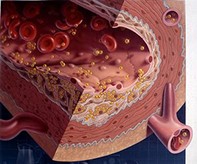Peer Reviewed
Feature Article Pharmacology and therapeutics
Lipid therapy: an update on the evidence
Abstract
Lipid-modifying therapy significantly reduces the risk of initial and recurrent cardiovascular disease and is generally safe. LDL-cholesterol below 2.5 mmol/L is an arbitrary goal, and recent trials support the benefit of achieving this or even lower levels.
Key Points
- Lipid disorders and lipid therapy occupy GPs on a daily basis; lipid-modifying drugs comprise the largest class of subsidised drugs in Australia.
- Since 1994 controlled trials have supported original assumptions that diet and drug therapy to lower cholesterol would reduce patients’ future risk of cardiovascular disease and mortality.
- A recently published meta-analysis of 14 randomised statin trials has reinforced the notion that the absolute benefit of therapy relates chiefly to an individual’s absolute risk of CVD and the absolute reduction in LDL-cholesterol level achieved.
- Randomised comparisons of different statin regimens in patients with prior coronary disease indicate that achieving much lower levels of LDL-cholesterol will generate even further reductions in CVD risk.
- In patients with type 2 diabetes, fenofibrate has been shown to reduce the risk of nonfatal myocardial infarction, the need for revascularisation and the risk of microvascular disease.
Purchase the PDF version of this article
Already a subscriber? Login here.

